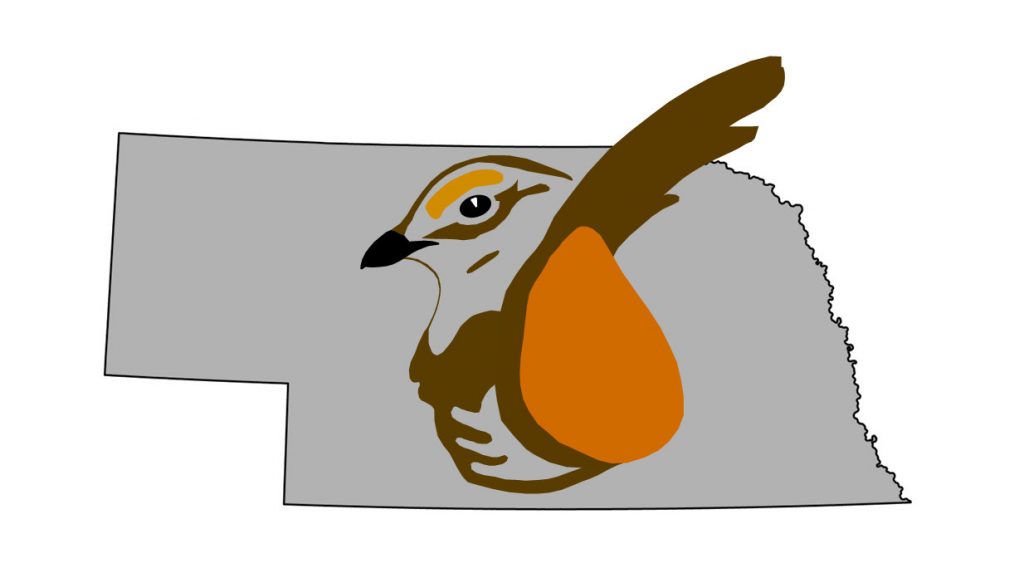Poecile atricapillus x gambeli
Status: No accepted records (but see Comments).
Comments: Although Mountain and Black-capped Chickadee apparently hybridize “extensively in Rio Grande valley of central New Mexico” where neither species is common, hybridization is only occasional in the large area of overlap of the ranges of the two species where each species is common and they separate by habitat (McCallum et al 2020, Grava et al 2013). Although Phillips (1986) was “aware of no authentic specimen” of hybrid Black-capped and Mountain Chickadees, and McCallum et al (2020) noted that a purported hybrid from Wyoming was thought to be a slightly aberrant Black-capped Chickadee and not a hybrid, evidence is accumulating that hybrids or at least introgressants do occur in eastern Colorado and southeastern Wyoming (eBird.org, accessed Feb 2021).
Hybrids were reported in the Laramie Mountains of eastern Wyoming in early Oct 2017 (Cody Porter, eBird.org), only about 75 miles from Nebraska, and, more significantly for Nebraska, at Wyoming Hereford Ranch at the east edge of Cheyenne, Wyoming. Ted Floyd determined that “many, if not most” of the chickadees in and around the ranch looked and sounded like intermediates (http://tinyurl.com/chickadee-2015-09-06a). Wyoming Hereford Ranch is about 35 miles from Pine Bluffs and the Nebraska border.
There are three records of phenotypic Black-capped Chickadees in Nebraska singing songs more akin to those of Mountain Chickadee, and a third likely record. Whether such birds are in fact hybrids or whether they learned incorrect songs as juveniles is unknown. If such birds are from the mixed populations in southeastern Wyoming described above, the latter explanation may be more accurate. An alternative explanation is suggested by studies carried out by Kroodsma et al (1999), who found that Black-capped Chickadees occupying various islands offshore from mainland Massachusetts sang discernibly different songs on different islands which were also different from the homogeneous mainland songs. There is a population of Black-capped Chickadees in Fort Collins, Colorado that sings aberrant songs (Gammon and Baker 2004). Mlodinow noted (personal communication) “there is a BCCH “Seattle” song type, which actually extends well into OR and BC…” (Foote et al 2020). The parallel in western Nebraska might be differing songs of chickadees occupying geologic features, such as the Pine Ridge and Wildcat Hills in Nebraska and the nearby Laramie Mountains in Wyoming, isolated from the contiguous population of Black-capped Chickadees in eastern and central Nebraska, but there is no evidence for this. It has been shown that Mountain Chickadees sympatric with Black-capped Chickadees sang songs more different than those of Black-capped than allopatric Mountain Chickadees (Grava et al 2013). This phenomenon was further studied by Taylor et al (2024) who concluded modification of Mountain Chickadee songs has occurred presumably to reduce competition between such closely related sympatric species according to character displacement theory; such reduced competition also was presumed to “reduce aggression from dominant black-capped chickadees and/or prevent maladaptive hybridization” (Taylor et al 2024). It seems possible that the mixed populations in eastern Colorado and western Nebraska indicate ongoing and apparently incomplete song differentiation and even “maladaptive hybridization” between the two chickadee species in these areas.
Recently, recordings were made by Steve Mlodinow in Gering Cemetery, Scotts Bluff Co 28 Apr 2019 of phenotypic Black-capped Chickadees that responded to songs of both species, but more strongly to those of Mountain Chickadee and sang more like Mountain Chickadees (ML154665171 Black-capped Chickadee Macaulay Library). A similar phenomenon was noted by Rosche (1974), who found two chickadees in the Wildcat Hills of southern Scotts Bluff Co 18 Jul 1974 which resembled Black-capped Chickadees morphologically but sang Mountain Chickadee songs. Rosche had not heard any Mountain Chickadee songs at the site until he played a tape, at which time the two singing birds appeared. The two birds did not respond to taped Black-capped Chickadee songs. A song “reminiscent” of Mountain Chickadee’s song was heard south of Redington, Morrill Co 27 Jun 2003, about 20 miles southeast of Rosche’s 1974 location. More surprising was a recorded Black-capped Chickadee song in Keya Paha Co 7 Jun 2022 that had elements of Mountain Chickadee song (Mlodinow, https://ebird.org/checklist/S112412553).
Literature Cited
Foote, J. R., D. J. Mennill, L. M. Ratcliffe, and S. M. Smith. 2020. Black-capped Chickadee (Poecile atricapillus), version 1.0. In Birds of the World (A. F. Poole, Editor). Cornell Lab of Ornithology, Ithaca, NY, USA. https://doi.org/10.2173/bow.bkcchi.01.
Gammon, D.E., and M.C. Baker. 2004. Song repertoire evolution and acoustic divergence in a population of black-capped chickadees, Poecile atricapillus. Animal Behaviour 68: 903-913.
Grava, A., K.A. Otter, T. Grava, S.E. LaZerte, A. Posel, and Andrew C. Rush. 2013. Character displacement in dawn chorusing behaviour of sympatric mountain and black-capped chickadees. Animal Behaviour 86: 177-187.
Howe, W.H. 1985. Hybridization in Black-capped (Parus atricapillus) and Mountain (P. gambeli) Chickadees in the Middle Rio Grande Valley of New Mexico. Master’s Thesis, University of New Mexico, Albuquerque, New Mexico, USA.
Kroodsma, D.E., B.E. Byers, S.L. Halkin, C. Hill, D. Minis, J.R. Bolsinger, J. Dawson, E. Donelan, J. Farrington, F.B. Gill, P. Houlihan, D. Innes, G. Keller, L. Macaulay, C.A. Marantz, and J. Ort. 1999. Geographic variation in Black-capped Chickadee songs and singing behavior. Auk 116: 387-402.
McCallum, D.A., R. Grundel, and D.L. Dahlsten. 2020. Mountain Chickadee (Poecile gambeli), version 1.0. In Birds of the World (A. F. Poole and F. B. Gill, Editors). Cornell Lab of Ornithology, Ithaca, NY, USA. https://doi.org/10.2173/bow.mouchi.01.
Phillips, A.R. 1986. The known birds of North and Middle America. Part 1. Published by the author, Denver, Colorado, USA.
Rosche, R.C. 1974. Mixed-up chickadees. NBR 42: 80.
Taylor, O., K. Grabenstein, A. Theodosopoulos, H. Leeson, S. Taylor, and C. Branch. 2024. Chickadees sing different songs in sympatry versus allopatry. Journal of Evolutionary Biology. https://doi.org/10.1093/jeb/voae114.
Recommended Citation
Silcock, W.R., and J.G. Jorgensen. 2024. Black-capped x Mountain Chickadee (hybrid) (Poecile atricapillus x gambeli). In Birds of Nebraska — Online. www.BirdsofNebraska.org
Updated 11 Oct 2024